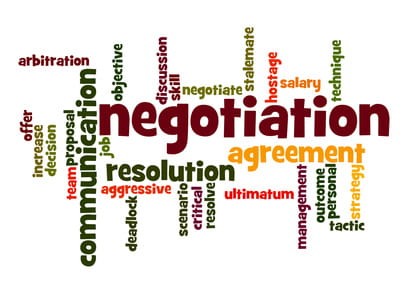
Effective Negotiation and Influence (Photo Credit: negotiations.com)
I participated in a day-long workshop titled “Effective Negotiation and Influence” with Ejazur Rahman organized by bAcademy. I would love to share the insights and my learning from this workshop. So let’s start…
About b-academy:
b-academy is a program run by the HR department of bKash Ltd. for its full time-employees only. It offers several technical, non-technical, hard skill, and soft skill learning workshops for bKash employees.
About Instructor:
Ejazur Rahman, Managing Director & Lead Coach - Mind Mapper Bangladesh, CEO (Asia) ISCEA - International Supply Chain Education Alliance
What Is Negotiation And The Science of Persuasion?
Negotiation is the process of resolving conflict between two or more parties whereby both or all modify their demands to achieve a mutually acceptable compromise.
If we look closely, as humans, everyone does anything mainly for one of the below two reasons:
- Desire to avoid pain.
- Desire and need to gain pleasure.
So these 2 things drive all the human behavior. That is why, when we are going to negotiate with someone, the main purpose should be to achieve these two points.
Types of Negotiation
- Distributive: It is sometimes called “win/lose” negotiation.
- Integrative: It is also called “win/win” or principled negotiation. As it is win/win, it is a more effective type of negotiation. The main motives of this type of negotiation are like looking for mutual gain, being hard on the subject and soft on people, being honest and having no tricks or posturing, etc.
Tools of Creating Influence Over Someone
- Rapport (for long-term changes to happen): Identify the deep wants or disliking of the people, and start pacing and leading.
- Use of questions, understand people, and let him know your way by good questions.
- Maintain personal congruency in word, body posture, and everything, every single day.
- State management: Manage your own emotions and other things in front of others.
How To Win People To Your Way of Thinking?
- The best way to get the best from an argument is to avoid it.
- Never say “you are wrong”; show respect for others’ opinions.
- Admit your fault or wrong quickly and emphatically.
- Be friendly at all times, but protect fire with fire.
- Let the other person do a great deal of talking.
- Keep the “you attitude,” which means let the other person feel the idea is his or hers.
- Dramatize your idea to express it.
- Try honestly to see things from the other person’s point of view.
Important Negotiation Related Terms
- Negotiation Position: It defines the simple statement about what you want.
- Negotiation Interest: It defines the underlying reason for the position.
- Negotiation Gap: It is the difference or gap between two parties’ wants.
- BATNA: Best alternative to negotiated agreement, meaning what is the best alternative if the negotiation ends with no result.
- RV (Reservation Value): The value of things that are in hand and can be offered for continuing negotiation.
- ZOPA (Zone of Possible Agreement): It is the set of all possible deals that would be acceptable to both parties.
6 Steps Preparation for a Successful Negotiation
- Research your BATNA and RV and the other party’s BATNA and RV and identify the ZOPA.
- Prioritize the moving and considering parts of the negotiation and prepare the priority list.
- Map concessions mean the give-and-take items.
- Identify the bargaining partner’s need and play accordingly.
- Find the connection or references to prove the strategic points.
- Learn the stockholders and decision makers of the opposite party’s end.
Strategies of Influence
- Highlights potential losses rather than potential gains.
- Disaggregate their gains and aggregate their losses.
- Employ the door-in-the-face (DITF) technique, which means initially reject an aggressive offer that will then increase the gain capacity.
- Employ the foot-in-the-door (FITD) technique, which means offering step-by-step rather than a bundle offer.
- Leverage the power of justification.
- Leverage the power of social proof.
- Use reference points to make your offers and demands seem reasonable.
Conclusion:
I hope this knowledge and these techniques help you to gain the best from any kind of negotiation. Always think in a win/win way.